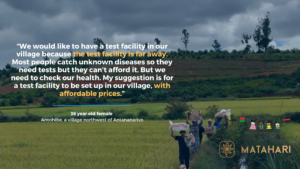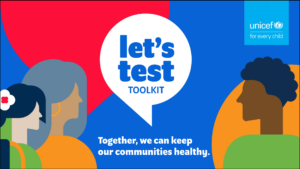
Understanding barriers to diagnostics access in Madagascar
Communities in Madagascar face numerous barriers in accessing diagnostics services. In this rapid
As in-vitro diagnostic (IVD) tools and technologies are procured and delivered to countries, advocacy and awareness efforts need to put in place to ensure their use. Raising awareness on the importance of diagnostics and advocating for its consumption across all levels of care enables governments to enact effective public health strategies and empowers patients and individuals to make informed choices in seeking care.
Diagnostic advocacy and awareness-raising is critical. Working to inform and influence key decision makers at the global, regional and local levels about the value of diagnostics and its use can lead to substantial change at the policy and implementation levels. Futhermore, working with civil society organizations, community health workers, and community groups is vital as they are at the heart of the response and help to ensure the delivery of testing services even in the most remote locations. However, throughout the COVID-19 pandemic, testing rates have remained low especially in low- and middle-income settings. There is a clear need for context-sensitive advocacy strategies supported by accessible advocacy and communication materials, aimed at increasing diagnostics literacy.
Awareness and advocacy investments for IVD tools and technologies to detect SARS-CoV-2 does not exist in a vacuum; it needs to be coupled with relevant tools and training to improve diagnostics literacy. Moreover, a context-sensitive approach is critical to meet people where they seek care when they need care. Therefore, equipping advocates, particularly those in-country, with the right tools and resources to raise awareness and advocate for continued prioritization of IVD testing for the diagnosis and screening of SARS-CoV-2 is essential. To address advocacy and awareness challenges, the ACT-Accelerator Diagnostics Pillar worked to support efforts at the global, regional, and local levels, working with governments, implementing partners, civil society organizations, community health care workers, and community groups to drive demand for test access.
With support from partners, the following key activities were prioritized to support awareness and advocacy efforts:
Awareness and advocacy investments for COVID-19 IVD tools and technologies raised awareness and increased demand for and access to tests. Notable advocacy and awareness achievements are highlighted below. To learn more about the awareness and advocacy achievements and work, refer to the key learnings and resource section below.
communities in 22 countries engaged in raising public awareness and demand for COVID-19 testing, treatment and vaccination
awarded to 22 low and middle income countries to implement test-and-treat interventions
global diagnostics advocacy strategy in development, informed by learnings from country-level advocacy projects
awarded to 21 in-country partners in 19 low and middle income countries developing and deploying COVID-19 test-and-treat advocacy strategies
Leveraging the ACT-Accelerator experience, there are key lessons to take forward to sustain progress in expanding the use of diagnostic tools and technologies for COVID-19 as well as other diseases of endemic and pandemic potential.

Communities in Madagascar face numerous barriers in accessing diagnostics services. In this rapid

The COVID-19 pandemic exposed global gaps in testing for communicable and noncommunicable
© All Rights Reserved 2023
The ACT-A Dx Knowledge Hub is hosted by FIND on behalf of the ACT-Accelerator Diagnostics Pillar partnership.